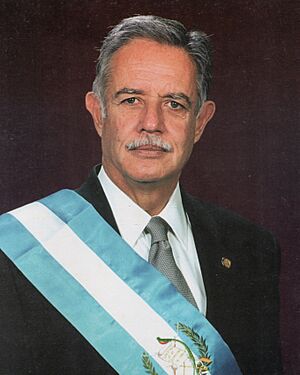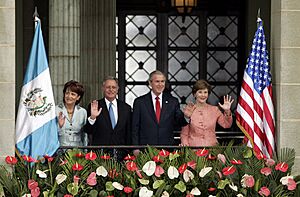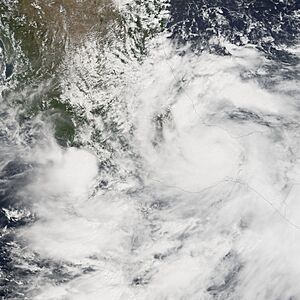Óscar Berger facts for kids
Quick facts for kids
Óscar Berger
|
|
|---|---|

Official portrait, 2005
|
|
| 46th President of Guatemala | |
| In office 14 January 2004 – 14 January 2008 |
|
| Vice President | Eduardo Stein |
| Preceded by | Alfonso Portillo |
| Succeeded by | Álvaro Colom |
| Personal details | |
| Born | 11 August 1946 Guatemala City, Guatemala |
| Political party | Independent (since 2003) |
| Other political affiliations |
National Advancement Party (until 2003) Grand National Alliance (2003–2005) |
| Spouse | Wendy de Berger |
| Children | 5 |
| Signature | |
Óscar José Rafael Berger Perdomo (born 11 August 1946) is a Guatemalan businessman and politician. He served as the 46th president of Guatemala from 2004 to 2008. Before becoming president, he was the mayor of Guatemala City from 1991 to 1999.
Contents
Early Life and Family
Óscar Berger was born into a family that owned large sugar and coffee farms. His grandparents on his father's side were immigrants from Belgium. He studied law and graduated from the private Jesuit Rafael Landívar University.
In 1967, he married Wendy Widmann, who also came from a land-owning family in Guatemala. They had a son and a grandchild.
Political Journey
Óscar Berger started his political career in 1985. He joined Álvaro Arzú's successful campaign to become the mayor of Guatemala City. From January 1991 to June 1999, Berger himself served as the mayor of the city.
After his time as mayor, he ran for president in the 1999 Guatemalan general election. He was the candidate for the National Advancement Party but lost to Alfonso Portillo.
Becoming Mayor of Guatemala City
Berger and Álvaro Arzú were friends from university. They started a group called the PAN civic committee, which later became the National Advancement Party (PAN). With Arzú's help, Berger won a seat on the Municipal Council of Guatemala City in 1986. He worked on different city committees, including Sports and Public Health. He also became a director for a popular soccer club in Guatemala.
In 1989, Berger and Arzú officially registered the PAN party. This new party, which was center-right, won the mayoral election in Guatemala City in 1990. Berger became mayor on 15 January 1991 and was re-elected in 1995.
The PAN party also did well in the 1995–96 Guatemalan general election. They won most of the seats in Congress. Álvaro Arzú then won the presidential election, defeating Alfonso Portillo.
Running for President
1999 Presidential Race
During Arzú's time as president, Berger showed interest in running for the top office. In June 1999, the PAN party officially named him as their candidate for the 1999 Guatemalan general election. Berger then left his duties as mayor to focus on his campaign.
His campaign focused on fighting poverty, increasing wages, and being tough on crime. However, Alfonso Portillo, who was running for president a second time, used a popular style of speaking that connected more with the people. Berger lost the second round of the election. Many thought his loss was partly due to President Arzú's leadership and how some state companies were sold off during his term.
This election loss caused disagreements within the PAN party. Some members left to form a new party. Berger also ended his friendship with Arzú, believing Arzú's leadership contributed to his defeat.
2003 Presidential Race
In 2002, Berger returned to politics. He joined a new group of conservative parties called the Great National Alliance (GANA). This group included the Patriot Party, the Reform Movement, and the National Solidarity Party. Because he joined GANA, he was removed from the PAN party. However, since he was leading in the polls, Berger accepted GANA's nomination for president.
The 2003 Guatemalan general election was notable for the unusual registration of Efraín Ríos Montt as a candidate, even though the constitution usually prevented it. The election also saw some political leaders face threats. Montt did not get enough votes to reach the second round. The election then became a race between Álvaro Colom of the National Unity of Hope (UNE) and Berger. Berger campaigned for political, economic, and social improvements. He won the election with 54% of the votes. His group also won 47 seats in Congress.
Presidency (2004–2008)
Óscar Berger became the 46th president of Guatemala on 14 January 2004. In his first speech, he promised to make government stronger, uphold the law, and fight against those who acted without consequences. Early in his presidency, investigations began against former officials from the Portillo government. This led to hopes that the government would fix problems within the state. However, these investigations slowed down, which caused Berger's public approval to drop.
Domestic Policies

President Berger approved the building of several highways in Guatemala. He also oversaw the renovation of the Aurora International Airport. He made changes to the army and recognized the government's responsibility for past war crimes. He appointed Rigoberta Menchu, a well-known figure for peace and indigenous rights, as a special ambassador. Most of the people in his government came from wealthy families.
During his presidency, there were also serious events that showed problems within the government. These included issues with a regional parliament, a prison takeover, and large robberies.
International Commission against Impunity in Guatemala (CICIG)
On 12 December 2006, the United Nations and the Government of Guatemala signed an agreement. This agreement created the International Commission Against Impunity in Guatemala (CICIG). After being approved by the courts in May 2007, it was confirmed by Congress in August 2007. The CICIG was an independent international group. Its goal was to help the Public Prosecutor's Office and the National Civil Police investigate crimes and help break up illegal groups.
Hurricane Stan

In October 2005, Guatemala faced one of its worst natural disasters. Hurricane Stan hit Central America, causing widespread damage in Guatemala. It led to many deaths and missing people, and countless others were affected.
The destruction was so severe that President Berger declared a "state of public calamity."
Foreign Policies
In March 2006, President Berger approved the Central American Free Trade Agreement (CAFTA).
In June 2006, the Berger government, along with the governments of El Salvador, Honduras, and Nicaragua, signed the Central America-4 Free Mobility Agreement. This agreement allowed citizens to travel freely between these four countries without many restrictions.
After the Presidency
Óscar Berger's time as president ended on 14 January 2008. Álvaro Colom then became the new president.
See also
 In Spanish: Óscar Berger para niños
In Spanish: Óscar Berger para niños
- Politics of Guatemala
- List of political parties in Guatemala
 | DeHart Hubbard |
 | Wilma Rudolph |
 | Jesse Owens |
 | Jackie Joyner-Kersee |
 | Major Taylor |

